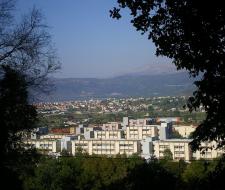Higher education in Greece for international students
- Costs of Studying in Greece: How Much Does Higher Education Cost in Greece
- History of Higher Education in Greece
- The best universities in Greece
- In-demand specialties and areas
- Greek Language Proficiency Exam – Ellinomatia (Ελληνομάθεια)
- The main advantages of higher education in Greece
- Higher education system in Greece
- Education in higher educational institutions in Greece. Universities in Greece
- The process of admission to universities in Greece
-

-

-
 from 2143.00 € / year
from 2143.00 € / year -

-
 from 1000.00 € / year
from 1000.00 € / year -
 from 800.00 $ / year
from 800.00 $ / year -
 from 807.00 € / year
from 807.00 € / year -

-
 from 746.00 € / year
from 746.00 € / year -
 ranked 51st in the world by the QS for the year 2022
ranked 51st in the world by the QS for the year 2022 GreeceAthensCurrently watching: 1from 4500.00 € / year
GreeceAthensCurrently watching: 1from 4500.00 € / year
Greece is one of the most amazing and unique in its beauty countries in Europe with an ancient history and culture. Thousands of tourists are attracted here by the beautiful nature, the sea, the sun and the mild climate. But many do not know that a large number of applicants come to Greece every year, because here you can get a high-quality higher education!
Alternative destinations
Costs of Studying in Greece: How Much Does Higher Education Cost in Greece
Higher education in Greece for foreign students is practically free of charge – you just need to pay an annual university fee, the amount of which depends directly on the chosen university and specialty; Compulsory Greek language courses will also be paid. Prices for studying in Greece can vary from €3,000 to €8,400.
But foreign students will still have expenses. The main part concerns accommodation. Foreign students have two options:
- Accommodation in the university dormitory,
- Rent an apartment.
The first option will be much cheaper, but there are always very few places in dormitories, so you need to have time to apply. Apartment prices range depending on the city, and area of housing: for example, in Athens, the cost of rent can "float" from €300 to €600 and above. In addition, living in an apartment, you will have to pay separately for utilities - but this is usually up to €100 per month.
Food should be taken into account, when calculating total costs of studying in Greece. On average, the expenses wil account to €100 per month per person (but this amount does not include visits to cafes and restaurants). In addition to accommodation and meals, you will need to pay for household needs - cellular communications, Internet, buying clothes, entertainment costs, and so on. In this case, you individually determine the amount that is comfortable for you.
While pursuing higher education in Greece, each student is provided with the opportunity to work legally (no more than 20 hours per week). Most students choose the service sector.
History of Higher Education in Greece
Education in Greece goes back deep to antiquity, when Plato and Aristotle founded the Academy and the Lyceum, respectively, which became the place where the sciences were studied and knowledge and ideas were exchanged.
Until the XIX century, higher education was the privilege of only a narrow circle of people, but with the acquisition of independence by Greece, education began to develop. Already in 1837, the first modern university in the country appeared - the University of Athens. In the period from the late XIX - early XX centuries, the state, foreigners and wealthy citizens of Greece actively financed higher education. Therefore, Greek higher education borrowed a lot from German and French academic traditions, and teachers were even invited from these countries to universities.
Modern higher education in Greece offers students a system of scientific degrees in accordance with the Bologna system. There are more than 40 state universities in the country with a wide range of faculties and specialties.
The best universities in Greece
- Aristotle University of Thessaloniki is the largest university in the Balkans, teaching just under 100 thousand students in 11 faculties. A unique feature of the institution is the presence of its own farm and seismological station. It even has its own hospital!
- The National and Kapodistrian University of Athens is the oldest university not only in the country, but also in the entire Eastern Mediterranean region. The popularity among students is related to its medical faculties.
- The National Technical University of Athens is a member of the international associations of technical universities TIME and CESAER. This university has come a long way from the Royal School of Art to the Polytechnic .
- The University of Crete is recognized as one of the best universities in Greece. There are several research centers here, medicine and exact sciences are considered strong directions of studying.
- The University of Patras is the third largest in the country. The university has established partnership with a large number of international organizations, providing opportunities for student exchange and internships abroad. The most demanding directions are engineering, medical and biological, and management.
In-demand specialties and areas
Greek universities offer students a wide range of directions of studying and faculties. Among the most popular are:
- Medicine (from surgery to therapy). To enter, it is necessary to obtain the highest score. Also you will need to demonstrate excellent academic performance.
- Information technologies. Applied specializations are in particular demand: financial areas, biomedicine, cybersecurity.
- Tourism is a popular direction in Greece. There are more than 20 specialties in this area, the most prestigious are management and entrepreneurship in the field of tourism.
- Engineering. Specialists in this field have also occupied a leading position in the list of demand.
- Agro-industrial areas – this area is an important part of the Greek economy: specialists with this diploma are always in great demand.
Greek Language Proficiency Exam – Ellinomatia (Ελληνομάθεια)
If you are interested in entering public universities in Greece, you must have a certificate of knowledge of the Greek language. If you lack a certificate, you can take the exam in special centers, which are located in all major Greek cities.
The exam consists of several parts:
- Language rules test is aimed at assessing the applicant's vocabulary and general understanding of the language,
- Essays – 2 texts on a specific topic (in official and free formats),
- Oral part, where the applicant is talked about a certain topic.
To enter, you need a language proficiency level of B2 ("good", level 4), but for some specialties they require at least G1 ("very good", level 5 out of 6 possible).
Usually the exam is conducted in May. In case of failing the entrance exam on the first try, an applicant has a chance to retake it in September. If a knowledge level is not enough to pass the exam, there are special courses at universities. On average, the tuition fee makes up about € 700 for the entire period of study.
The main advantages of higher education in Greece
- A prestigious European diploma which has gained recognition in all countries of the world.
- Most universities organize one-year internship in European countries for 3-4 years of study.
- Foreign students can obtain education free of charge.
- Discounts and benefits for students – the provision of educational materials, discounts in university canteens and public transport, assistance in obtaining housing, free medical insurance and subscriptions to the gym, museums, libraries.
- Exchange programs with partner universities abroad.
- Opportunity to obtain financial support from the university.
- Great opportunities for the employment of students.
Higher education system in Greece
Compulsory education in the country begins at the age of 6 (grade 1) and lasts until the end of secondary school (15 years). After that, students decide for themselves whether to continue their education at a lyceum, college or vocational school. Only graduates of lyceums can get higher education, and they do not even need to take entrance exams - good marks in the certificate are enough.
The system of higher education in Greece has a number of features:
- All universities teach religious studies, which is considered a very important subject,
- Free tuition is available even for international students. The only expenses for students are annual university fees, accommodation and board, but given the general standard of living in the country, these costs are not too high.
- Knowledge of the Greek language is mandatory, for which foreign students are given a preparatory year,
- Private educational institutions in Greece do not have state accreditation, but there are branches of international universities which offer English-language programs to students,
- Foreign applicants can apply to 20 (!) universities at the same time.
Higher education in Greece is based on the Bologna system, offering the traditional three stages of study. A distinctive feature of the local bachelor's degree is the duration of study - from 4 years (compared to the standard 3 years) to 5-6 years, depending on the chosen faculty. For example, engineering majors and applied sciences will require 5 years of study, while medical faculties will require 6 years. Upon completing studies, graduates obtain a bachelor's degree. With this diploma, they can continue their education in a master's degree (1-3 years) or find a job in their specialty.
The final stage of education in Greece is the degree of Doctor of Science. To enter, a student is required to have a diploma of higher education (obtained in Greece), engage in scientific activities and write a dissertation.
Education in higher educational institutions in Greece. Universities in Greece
The following institutions provide the opportunity to obtain the higher education in Greece:
- Academic universities, where the emphasis is on theoretical knowledge and scientific research,
- Technological institutes: students study applied disciplines and are engaged in scientific and technical research. Effective preparation of specialists of a narrow profile is conducted. Also, educational process stipulates an internship, which is usually organized in the last semester.
The academic year at universities in Greece consists of 2 semesters, after each student takes an examination session. Curricula are based on the study of compulsory disciplines and subjects of the student's choice. However, most of the time students are engaged in independent learning - about 60%.
Among the unique advantages of Greek universities is the almost zero chance of being expelled for academic failure. If students miss classes or do not pass exams, they are given a deferment for additional preparation. It is enough to pass at least 35% of the required program so that the student is not expelled.
If a foreign student is interested in obtaining a higher education in Greece, he will be required to provide a certificate of knowledge of the Greek language (University of Athens, University of Thessaloniki or the Greek Language Center). If you lack this document, the foreign student will have to take paid language courses. The course duration varies from 8, 6 weeks or 3 months. During the study, the place at the university is retained by the student.
The country has the Hellenic Open University, a unique university that offers distance higher education. Its structure includes several areas, including humanities, economics, social and natural sciences, information technology.
The process of admission to universities in Greece
There are not significant obstacles in entering Greek universities, even for foreign applicants: there are no special entrance requirements and exams, students are assessed by the points of the school certificate. However, a certificate of knowledge of the Greek language is required. Also, for admission, you must provide a certain package of documents that is translated into Greek and notarized:
- Application with photo,
- Certificate
- A document confirming that there are no Greeks among the close relatives,
- Official confirmation that the applicant does not have degrees and diplomas from Greek universities,
- Resume
- Language certificate.
An interesting fact is that the package of documents is sent to a single admissions committee, and not to the university chosen by the applicants. Only 10 days are allocated for consideration of documents - from July 20 to July 30.
When a positive answer has been received from the university, the student must apply for a visa for the period of study (this can be done at the Consulate of Greece in your country). The visa is issued for a long-term (type D) and will allow the student to travel freely to European countries.
Learning programs-summary information
| Name | Meaning | Equivalent | Min. age | Duration, years |
Next stage | Cost |
|---|---|---|---|---|---|---|
| GCSE | General certificate of secondary education | secondary education (non-accomplished) | 14 | 1–2 | A-Levels | 15,000 USD+ |
| A-Levels | Advanced level | secondary education (accomplished) | 16 | 2 | University | 15,000 USD+ |
| BTEC | Business and Technology Education Board | secondary special education | 14 | 2–3 | University/ work | 15,000 USD+ |
| Oxbridge Preparation | Preparing for Oxford and Cambridge | secondary education (accomplished) | 17 | 1 | University | 15,000 USD+ |
| International Baccalaureate | International baccalaureate | secondary education (accomplished) | 16 | 2 | University | 18,000 USD+ |
| Foundation/ Pathway Year | Preparatory year | admission to the 1st year of university | 17 | 1 | University | 14,000 USD+ |
| NCUK | The Northern consortium | 2 year university | 17,5 | 1 | 2 year University of NCUK | 13,000 USD+ |
| Special Preparation (Medics/Math/Business) | Specialized training | - | 14 | optional | optional | 4,000 USD+ |
| Academic English | Academic English | Language school | 8 + | 6–12 months | School or University | 8,000 USD+ |
Top 14 best universities in Switzerland 2026
| 1 | Glion Institute of Higher Education Switzerland |
| 2 | Les Roches International School Montana |
| 3 | César Ritz Colleges Switzerland |
| 4 | IHTTI School of Hotel Management |
| 5 | Ecole Hoteliere de Lausanne |
| 6 | Geneva Business School |
| 7 | HIM Hotel Institute Montreux |
| 8 | Swiss Hotel Management School |
| 9 | Webster University Geneva |
| 10 | Business and Hotel Management School |
| 11 | Luzern IMI |
| 12 | Swiss Hotel Management School (SHMS) Caux |
| 13 | International University in Geneva |
| 14 | Culinary Arts Academy Switzerland |
